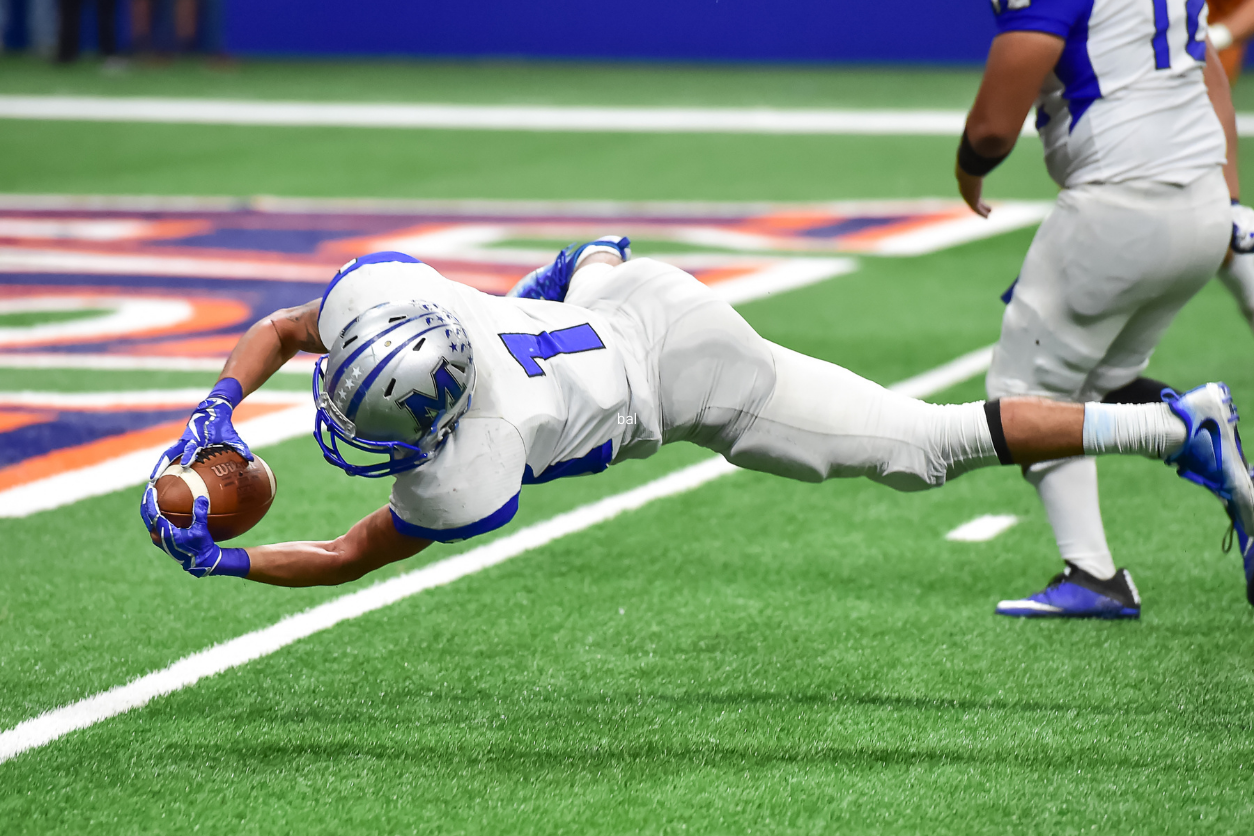The small steps that helped a 2A high school player make the leap to Division I.
After attending a University of Iowa football camp before his sophomore year of high school, Aaron Graves went back to teaching swimming in his hometown of Gowrie, IA, population 900. Two days later, according to a recent article in The Athletic, Iowa head coach Kirk Ferentz called to verbally offer Graves a scholarship, which he accepted. Graves was 15 and had just finished his first season of high school football at Southeast Valley High School, which competes in Class 2A.
A 15-year old, Class 2A, small-town football player receiving a scholarship offer is notable. But what Graves has done since then can serve as an example to any recruit, five-star or one-star, big school or small school.
Graves Stuck To His Guns
While it was his size and athleticism that first caught the eye of Iowa’s coaches, Aaron Graves wasn’t a small school secret for very long. Ultimately, he was rated a four-star recruit, one of the nation’s Top-100 recruits in the 2022 class, and he grew to 6-foot-5, 270 pounds. That got him interest from Notre Dame, Penn State, Iowa State, and many others. But Graves never wavered in his commitment to Iowa and was honest and upfront about it with every other school that called.
Graves always wanted to play for Iowa and by making his commitment at age 15, and sticking to it, he essentially took all the pressure off himself. He knew where he was going to go, wasn’t worried about who might make the better offer, and that gave him more time to become a better football player.
Granted, not every recruit has the luxury of scholarship offers at age 15, nor can every recruit be locked in on their college of choice as a high school sophomore. And if you’re not sure what school is the right fit for you, it usually is a good idea to keep your options open. But if you’ve got your mind made up, making your decision and sticking to it can save you plenty of stress and hassle.
He Knew Where He Stood
Graves had no qualms about playing with the varsity in his freshman year of high school. His goal was to play at a Power 5 school, so he knew he’d have to be competitive with older players in high school.
That drive to excel is what helped propel Graves from Class 2A in Iowa to an NCAA Division I scholarship. He knew he’d be up against players that were older and stronger, and never stopped working in his desire to be better. That same situation is encountered every summer by every incoming football recruit. Think you’re ready to play against players that are older, bigger, faster, and more experienced? The majority of true freshmen won’t be, but by knowing where you stand, and the work you have to put in to push higher, you can at least earn the opportunity to challenge for playing time.
He Was A Multi-Sport Athlete
In addition to football, Graves weight-trained and competed in basketball and wrestling. While being a multi-sport athlete might be easier at a smaller school, Graves credits his year-round athletic regimen for his big league physique.
While most coaches might prefer athletes who focus solely on football, Aaron Graves is another example of how participating in other sports can actually help you round out physically for your chosen sport. Every athlete and situation is different, but if your participation in several sports can help you improve as a football player too, go for it.
He Planned Ahead
In addition to carrying a 4.0 GPA in high school, Graves began taking community college courses as a freshman. When he earns his high school diploma, he’ll also likely have enough credits to receive his associate’s degree from Iowa Central Community College.
Though not everyone can be halfway to a bachelor’s degree when they leave high school, good grades, and taking college courses in high school, can make you a more attractive recruit to a college coach. That’s because it shows a college coach that, in addition to your athletic abilities, you can handle college academically too. And that makes you a safer bet for a college coach.
He Eliminated The Noise
Graves noted that he doesn’t pay much attention to social media and has never even considered a Twitter account. The reason, he said, was to eliminate as much of the negativity from his life as possible.
If you want more time to enjoy high school and less time spent stressing over recruiting, you could do well to follow Graves’ example. Don’t pay attention to social media, sports media, or recruiting pundits. The goal of your recruiting process is to find the school and athletic program that’s right for you. Stressing over what you see in the media will only be an unneeded distraction that won’t help make your decision any easier.
Aaron Graves probably would have wound up with a DI football scholarship wherever he went to high school. But, hopefully, the route he’s taking from a small town to the big-time can help you make a better decision, with less stress and uncertainty, in your own recruiting.
Did you enjoy the article ‘How A Small Town Football Player Made A Big Recruiting Impact’? If so, check out more of our articles HERE.





